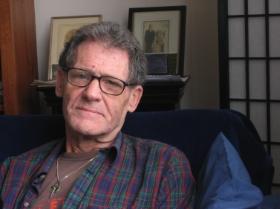David Carrell MacKay is surprised that more people don’t have specific memories of attending the historic We Demand demonstration on the steps of what was then Vancouver’s courthouse in August 1971.
At this point in his life, he says, “it’s easier to remember things from 40 years ago than yesterday.”
On Aug 28, 1971, when a group of gay men and women from Toronto travelled to Parliament Hill in Ottawa to present a list of demands to the Canadian federal government, MacKay was at a parallel Vancouver demonstration in Robson Square, where activists read from the same list.
The 10-point list asked for an end to state-legislated discrimination against gays.
MacKay recalls that he attended mostly out of a sense of obligation. “My friend Maurice Flood kept bugging me, and I thought, Well, just because they’re having something in Ottawa doesn’t mean we have to do something in Vancouver.”
He thinks that a resistance to taking perceived direction from Toronto may have been why only 20 people showed up at the Vancouver demonstration.
“There was this kind of attitude; that’s maybe one reason why that was small. But maybe there were other reasons, too. Some people were still fearful about demonstrating openly on the street ’cause we hadn’t done that before, especially without a permit.”
“There were only these few people and I thought, Aww fuck, this could be dicey,” he remembers. “We weren’t just being paranoid that somebody might just attack us physically from the street. ‘Cause that used to happen, and it was well before we were properly organized with tons of security . . . and trained in tactics to deal with these things.”
He says that besides the people in the demonstration there were another two or three on the street looking around to see if anybody was lurking.
MacKay believes it’s important to remember historical dates like the We Demand demonstration; however, for him and many others it wasn’t the first time they’d acted publicly for gay rights. “It’s not like it was the first time gay people had done anything, ’cause that was like a year, a year and a half old.”
“We’d already had the GLF [Gay Liberation Front] experience, which for me meant going to meetings, going to gay clubs, going on TV even. For me, that certainly wasn’t the first demonstration.”
For MacKay, coming out and becoming active in the gay rights movement came naturally. “I was from a very political family, so for me being political about being gay was just like falling off a log.”
By the time he came out at 22, he had already graduated from university and had been involved in “a whole lot of radical student politics, anti-war, anti-Vietnam war, NDP socialist politics.”
He also gives due to the leftwing political groups that became sometimes-reluctant allies in the push for equal gay rights.
“The Communist Party was sort of old hat and a bit too square and wasn’t quite sure whether it thought gay people were fully human,” he recalls laughingly. “It was kind of backward, so we oriented to the Trotskyist movement, which had a lot of negative sides of the Communist Party but at least was willing to do work in the gay community and open up to gay members.”
Forty years on, MacKay looks back proudly at all the progress he and his colleagues helped make.
“When we started, we had all these broad, sweeping general demands, and we had really no idea how long it might take or what would get through or what wouldn’t, and we didn’t realize that it was going to be a long hard slog and that it was going to take 30 or 40 years,” he says. “But, as we all fanned out and did what we did, if we didn’t die, and if we had the guts and the courage and the stick-to-itiveness to carry on, we would get to see some of these things achieved.”
MacKay went on to push successfully for gay rights and employment equity, first in the postal workers’ union and then later as a teacher.
“Some things died, other things came to fruition. Basically, we’re through one era, and God knows what era we’re into now; certain things are still unresolved.”
Even with all the progress that has been achieved, he bristles at the idea that the fight for equal rights is over.
“People were saying, ‘Oh gays aren’t discriminated against anymore’ even in the ’90s,” he says.
“Even if we do have our civil rights, they still hate us and kill us. I’m very well aware it’s not just in other countries of the world, but even right here in Canada discrimination exists, hatred exists, violence against gay people exists, and the law is not equal. There is still a fucking homosexual-panic defence in the law.”
As a senior and an avid traveller, he knows there are some freedoms he still doesn’t have. “Not only where can I go, where I can get into the country, but where can I go where I’m not discriminated against. We are still limited in terms of where we can go and what we can do.”

 Why you can trust Xtra
Why you can trust Xtra


